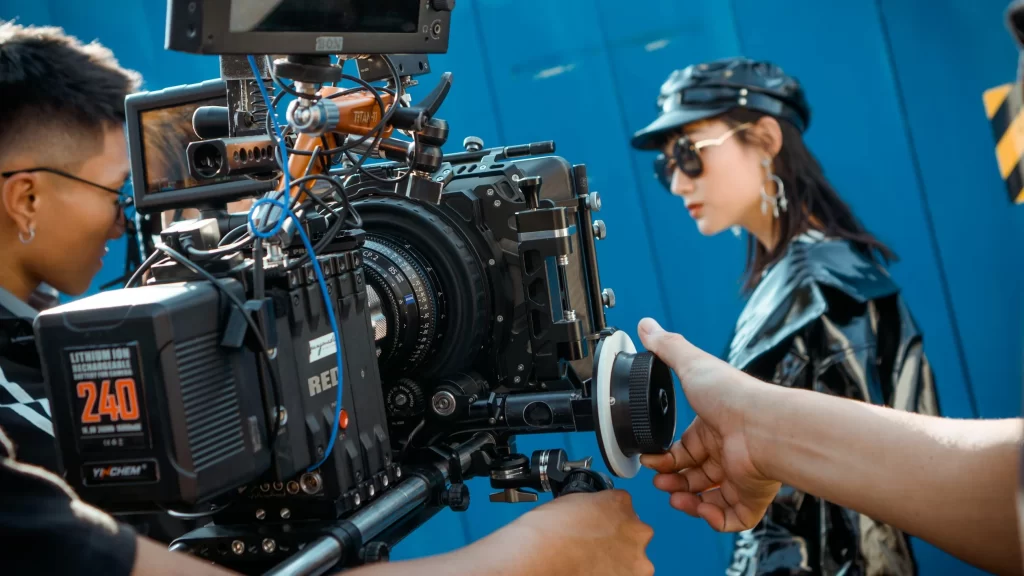Filmmaking is an exciting and dynamic field that blends creativity with technical expertise. As a filmmaker, you have the opportunity to tell stories that can entertain, educate, and inspire audiences around the world. The importance of filmmaking lies in its ability to capture the human experience and convey it through visual and auditory means, making it a powerful medium for communication and expression.
How to Become a Filmmaker?

- Educate Yourself: While formal education isn’t mandatory to become a filmmaker, it can provide invaluable knowledge and skills. Pursuing a degree in film studies, cinematography, or a related field offers structured learning, access to industry professionals, and practical experience through internships or student projects. However, many successful filmmakers have also honed their craft through self-study, workshops, and online resources.
- Master the Basics: Understanding the fundamental principles of filmmaking is crucial. Learn about storytelling, screenwriting, cinematography, editing, sound design, and directing. Experiment with different roles to discover your strengths and interests within the filmmaking process.
- Practice, Practice, Practice: Filmmaking is an art that requires continuous practice and refinement. Start by creating short films, music videos, or documentaries with whatever equipment you have available. Focus on telling compelling stories, experimenting with different techniques, and soliciting feedback to improve your skills.
- Build Your Portfolio: A strong portfolio is essential for showcasing your talent and attracting potential collaborators or employers. Compile your best work into a professional reel or portfolio website that highlights your unique style and abilities. Consider participating in film festivals, competitions, or online platforms to gain exposure and recognition.
- Networking and Collaboration: The film industry thrives on relationships and collaboration. Attend industry events, film screenings, and networking mixers to meet fellow filmmakers, producers, and potential mentors. Collaborating on projects not only enhances your skills but also expands your professional network and opens doors to new opportunities.
- Stay Updated and Adapt: The film industry is constantly evolving with new technologies, trends, and storytelling techniques. Stay updated on industry news, attend workshops or seminars, and embrace emerging technologies to stay relevant and competitive in the field.
- Persistence and Resilience: Success in filmmaking often requires perseverance and resilience in the face of challenges and rejections. Be prepared for setbacks, criticism, and failures, but never lose sight of your passion and vision. Learn from every experience, adapt to feedback, and keep pushing forward towards your goals.
-
Seek Mentorship and Guidance: Finding a mentor or experienced filmmaker who can offer guidance, advice, and support can be invaluable. Look for mentors who share your passion and values, and don’t hesitate to reach out and ask for mentorship or advice. Learning from someone who has navigated the challenges of the industry can provide invaluable insights and shortcuts to success.

The Benefits of Becoming a Filmmaker
1. It’s a Creative Outlet:
Filmmaking allows you to bring your imagination to life. From developing a script to directing actors and composing shots, every aspect of the filmmaking process is an opportunity to express your creativity. Whether you’re crafting a compelling narrative or experimenting with visual effects, the possibilities are endless.
2. There’s Variety in Your Workday:
No two days are the same in the world of filmmaking. One day you might be scouting locations, and the next you could be editing footage in the studio. This variety keeps the job exciting and ensures that you’re constantly learning and adapting.
3. You Can Collaborate with Talented Individuals:
Filmmaking is a collaborative effort that brings together a diverse group of professionals, including writers, actors, cinematographers, editors, and sound designers. Working with talented individuals from different backgrounds can enhance your own skills and broaden your perspective.
4. There’s Advanced Filmmaking Technology:
The technological advancements in filmmaking have made it easier than ever to produce high-quality films. From digital cameras and drones to sophisticated editing software, filmmakers have access to tools that can help bring their vision to life in stunning detail.
5. There Are Travel Opportunities:
Filmmaking can take you to places you might never have otherwise visited. Whether you’re filming on location in a foreign country or attending film festivals around the world, the travel opportunities are plentiful.
6. You Can Become a Well-Known Director:
Successful filmmakers often gain recognition for their work, which can lead to further opportunities in the industry. Becoming a well-known director not only opens doors to new projects but also allows you to influence and inspire future generations of filmmakers.
7. You Can Share Your Films:
With the advent of digital platforms and social media, sharing your films with a global audience has never been easier. This ability to reach viewers around the world can amplify your impact and help you build a loyal following.
Common Challenges for Becoming a Filmmaker

1. Distribution:
One of the biggest challenges filmmakers face is getting their films distributed. Securing a distribution deal can be difficult, especially for independent filmmakers who may lack the connections and resources of larger studios.
2. Budget and Schedule:
Managing a film’s budget and schedule requires careful planning and discipline. Cost overruns and delays can derail a project, making it essential to stick to the plan and adapt when unexpected issues arise.
3. Creative Control:
Maintaining creative control over your project can be challenging, particularly when working with studios or investors who have their own vision and priorities. Balancing artistic integrity with commercial viability is a common struggle.
4. Creativity:
Keeping your creativity flowing can be tough, especially when facing tight deadlines and other pressures. Finding ways to stay inspired and motivated is crucial for long-term success.
5. Technical Expertise:
Filmmaking requires a solid understanding of various technical aspects, from camera operation to sound recording and post-production. Keeping up with the latest technology and techniques is essential for producing high-quality work.
6. Budget Constraints:
Securing funding for a film can be a significant hurdle. Many filmmakers start with limited budgets and must find innovative ways to stretch their resources without compromising on quality.
7. Collaboration and Leadership:
Leading a film crew requires strong interpersonal and leadership skills. Effective communication, problem-solving, and the ability to inspire and motivate your team are crucial for a successful production.
8. Communication:
Clear and effective communication is vital throughout the filmmaking process. Misunderstandings or lack of clarity can lead to costly mistakes and delays.
9. Competition:
The film industry is highly competitive, with many talented individuals vying for the same opportunities. Standing out and making a name for yourself requires dedication, perseverance, and a unique voice.
10. Directing and Visual Storytelling:
Directing involves guiding actors and the crew to realize your vision while maintaining coherence and emotional impact in the storytelling. Mastering the art of visual storytelling is a continuous learning process.
11. Funding:
Securing financial backing is often a major challenge, especially for independent filmmakers. Understanding the different funding sources and how to approach them is critical for getting your project off the ground.
12. Script Issues:
A strong script is the foundation of any good film. Developing a compelling story and well-crafted dialogue takes time and skill, and even small weaknesses in the script can impact the overall quality of the film.
13. Technical Challenges:
From lighting and sound issues to equipment malfunctions, technical challenges can arise at any stage of production. Being prepared to troubleshoot and solve these problems is essential for keeping the project on track.
Effective Strategies for Becoming a Filmmaker

1. Choosing the Right Path:
There are many paths to becoming a filmmaker, and choosing the right one depends on your interests and goals. Whether you pursue formal education in film school, start by working on sets, or create your own independent projects, it’s important to find a path that aligns with your vision.
2. Courses:
Investing in education can provide you with valuable knowledge and skills. Many film schools and online courses offer programs in directing, screenwriting, cinematography, and other areas of filmmaking. These courses can also provide networking opportunities and industry connections.
3. Career:
Building a career in filmmaking often involves starting in entry-level positions and working your way up. Gaining experience as a production assistant, camera operator, or editor can provide a solid foundation and help you develop a comprehensive understanding of the filmmaking process.
4. Networking (Contacts):
Building a strong network is crucial for success in the film industry. Attend film festivals, join industry associations, and connect with other filmmakers, producers, and industry professionals. Networking can open doors to new opportunities and collaborations.
Case Studies
1. Quentin Tarantino:

Quentin Tarantino began his career working in a video rental store, where he developed a deep passion for film. He wrote and directed “Reservoir Dogs,” which premiered at the Sundance Film Festival and launched his career. Tarantino’s unique style and storytelling have made him one of the most influential filmmakers in Hollywood.
2. Kathryn Bigelow:

Kathryn Bigelow started as a painter before transitioning to film. She became the first woman to win the Academy Award for Best Director with “The Hurt Locker.” Bigelow’s journey highlights the importance of persistence and breaking barriers in the industry.
3. Steven Spielberg:

Steven Spielberg’s career began with short films and television. His big break came with “Jaws,” which became a blockbuster and established him as a major director. Spielberg’s career is a testament to the power of storytelling and innovative filmmaking.
Verdict
Becoming a filmmaker is a challenging yet rewarding journey that requires creativity, perseverance, and a willingness to learn and adapt. By understanding the benefits and challenges, choosing the right path, and continually honing your skills, you can turn your passion for filmmaking into a successful career. Embrace the collaborative nature of the industry, leverage technology, and stay inspired by the stories you want to tell. Your unique voice and vision have the power to captivate audiences and make a lasting impact on the world of film.




